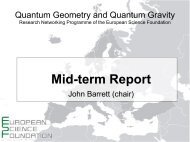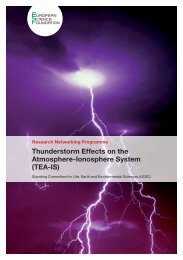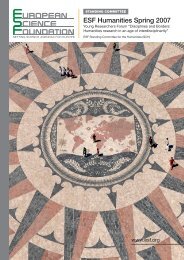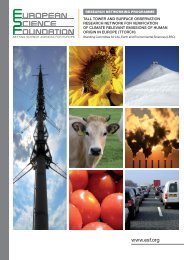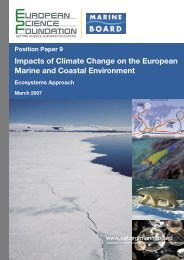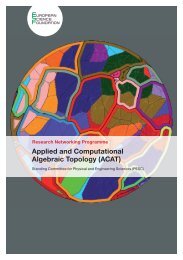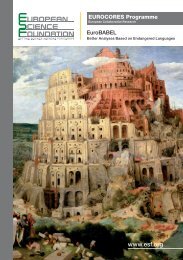European Peer Review Guide - European Science Foundation
European Peer Review Guide - European Science Foundation
European Peer Review Guide - European Science Foundation
Create successful ePaper yourself
Turn your PDF publications into a flip-book with our unique Google optimized e-Paper software.
Call for Proposals<br />
Priorities<br />
Pre-Proposals<br />
Initial Scientific <strong>Review</strong><br />
Policy and Strategy Plans<br />
Full Proposals<br />
Remote<br />
<strong>Review</strong>s<br />
Panel<br />
<strong>Review</strong>s<br />
Final Decision<br />
Site Visits<br />
Full Scientific <strong>Review</strong> and Selection<br />
67<br />
Figure 11. Overview of the whole process for the peer review and selection of Centres of Excellence<br />
8.2.2 <strong>Peer</strong> review stages<br />
<strong>Peer</strong> review as part of the evaluation of a Centres<br />
of Excellence programme will usually be a two- or<br />
three-stage process, utilising high-level and experienced<br />
reviewers culminating in a panel-based site<br />
review, usually conducted by the same members<br />
(or extended version) of the panel involved in earlier<br />
stages of review. In addition, it is likely that a<br />
form of strategic review will be incorporated in the<br />
process, so that national priorities and the needs of<br />
industry can be appropriately assessed. The process<br />
in fact may begin with a strategic decision for area(s)<br />
of national priority, resulting in open calls or dedicated<br />
calls for thematic areas or grand challenges.<br />
Although several stages are likely to be involved<br />
in the review of centre proposals, other models,<br />
such as specifically invited applications or one-stage<br />
review, may also be appropriate.<br />
In the case of a multi-stage process, the following<br />
are likely to be incorporated:<br />
• Call for proposals: The call can optionally include<br />
a pre-proposal or letter of intent;<br />
• Pre-selection: This stage of a pre-proposal or letter<br />
of intent evaluation often requires a panel or<br />
remote-based evaluation (followed by internal<br />
agency considerations) resulting in the selection<br />
of a small number of proposals that will progress<br />
to the next stage;<br />
• Formal invitation for full application: Full proposals<br />
will be specifically invited (following the first<br />
stage of review) or will be received during the call<br />
opening period in the case when no pre-proposal<br />
is required;<br />
• Remote written reviews: The full application will<br />
usually be sent for evaluation by individual/remote<br />
experts who submit detailed written reviews. The<br />
reviews will usually contain sections focusing on<br />
the detailed scientific proposal, track record of<br />
the applicants, as well as other criteria that are<br />
outlined in later sections and also considered by<br />
the visiting panels;<br />
• Panel site visit(s) and scientific review: For centres<br />
of excellence, particularly those of large scale,<br />
a detailed site visit is critical. These will ideally<br />
use an international panel of experts with a broad<br />
range of expertise and experience. The panel will<br />
often include experts who provide some of the<br />
written evaluations from earlier stages.<br />
– Centres are often, but not necessarily, defined<br />
by their pluri-interdisciplinary nature and the<br />
panel constitution should be tailored to reflect<br />
such differences.<br />
– As with the written reviews, the panel will<br />
evaluate scientific quality of the proposal and<br />
competence of the applicants. The review may<br />
very likely also examine areas such the governance<br />
and management of the centre, training<br />
and education and possibly any industrial collaborations<br />
that the centre may have.<br />
• Strategic review: A strategic evaluation of a centre<br />
proposal may often be required and should be<br />
made in the context of the scientific review, but<br />
performed separately. It may consider the following<br />
criteria:<br />
– National priorities, other science policy issues;<br />
– May involve a variety of national agencies and<br />
<strong>European</strong> <strong>Peer</strong> <strong>Review</strong> <strong>Guide</strong>



